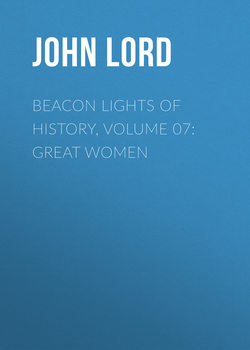Читать книгу Beacon Lights of History, Volume 07: Great Women - John Lord - Страница 5
SAINT THERESA
ОглавлениеA. D. 1515-1582
RELIGIOUS ENTHUSIASM
I have already painted in Cleopatra, to the best of my ability, the Pagan woman of antiquity, revelling in the pleasures of vanity and sensuality, with a feeble moral sense, and without any distinct recognition of God or of immortality. The genius of Paganism was simply the deification of the Venus Polyhymnia,–the adornment and pleasure of what is perishable in man. It directed all the energies of human nature to the pampering and decorating of this mortal body, not believing that the mind and soul which animate it, and which are the sources of all its glory, would ever live beyond the grave. A few sages believed differently,–men who rose above the spirit of Paganism, but not such men as Alexander, or Caesar, or Antony, the foremost men of all the world in grand ambitions and successes. Taking it for granted that this world is the only theatre for enjoyment, or action, or thought, men naturally said, "Let us eat and drink and be merry, for to-morrow we die." And hence no higher life was essayed than that which furnished sensual enjoyments, or incited an ambition to be strong and powerful. Of course, riches were sought above everything, since these furnished the means of gratifying those pleasures which were most valued, or stimulating that vanity whose essence is self-idolatry.
With this universal rush of humanity after pleasures which centred in the body, the soul was left dishonored and uncared for, except by a few philosophers. I do not now speak of the mind, for there were intellectual pleasures derived from conversation, books, and works of art. And some called the mind divine, in distinction from matter; some speculated on the nature of each, and made mind and matter in perpetual antagonism, as the good and evil forces of the universe. But the prevailing opinion was that the whole man perished, or became absorbed in the elemental forces of nature, or reappeared again in new forms upon the earth, to expiate those sins of which human nature is conscious. To some men were given longings after immortality, not absolute convictions,–men like Plato, Socrates, and Cicero. But I do not speak of these illustrious exceptions; I mean the great mass of the people, especially the rich and powerful and pleasure-seeking,–those whose supreme delight was in banquets, palaces, or intoxicating excitements, like chariot-racings and gladiatorial shows; yea, triumphal processions to raise the importance of the individual self, and stimulate vanity and pride.
Hence Paganism put a small value, comparatively, on even intellectual enjoyments. It cultivated those arts which appealed to the senses more than to the mind; it paid dearly for any sort of intellectual training which could be utilized,–oratory, for instance, to enable a lawyer to gain a case, or a statesman to control a mob; it rewarded those poets who could sing blended praises to Bacchus and Venus, or who could excite the passions at the theatre. But it paid still higher prices to athletes and dancers, and almost no price at all to those who sought to stimulate a love of knowledge for its own sake,–men like Socrates, for example, who walked barefooted, and lived on fifty dollars a year, and who at last was killed out of pure hatred for the truths he told and the manner in which he told them,–this martyrdom occurring in the most intellectual city of the world. In both Greece and Rome there was an intellectual training for men bent on utilitarian ends; even as we endow schools of science and technology to enable us to conquer nature, and to become strong and rich and comfortable; but there were no schools for women, whose intellects were disdained, and who were valued only as servants or animals,–either to drudge, or to please the senses.
But even if there were some women in Paganism of high mental education,–if women sometimes rose above their servile condition by pure intellect, and amused men by their wit and humor,–still their souls were little thought of. Now, it is the soul of woman–not her mind, and still less her body–which elevates her, and makes her, in some important respects, the superior of man himself. He has dominion over her by force of will, intellect, and physical power. When she has dominion over him, it is by those qualities which come from her soul,–her superior nature, greater than both mind and body. Paganism never recognized the superior nature, especially in woman,–that which must be fed, even in this world, or there will be constant unrest and discontent. And inasmuch as Paganism did not feed it, women were unhappy, especially those who had great capacities. They may have been comfortable, but they were not contented.
